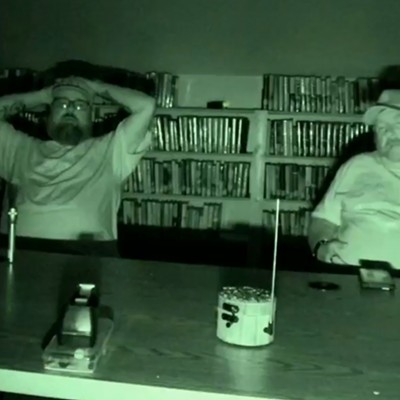Arlen Specter was outraged last year, when he learned the Bush administration was listening in on Americans' international phone calls without a warrant. "We're not going to give [Bush] a blank check," thundered Pennsylvania's other Republican senator.
And you know what? He didn't give Bush a blank check. In fact, Specter hasn't provided any kind of check — or balance — on Bush's ambitions at all.
The administration has claimed the wiretapping program was necessary for the "war on terror." But Specter initially saw it as a dangerous erosion of civil liberties.
At first, he even threatened to subpoena the CEOs of long-distance companies, to testify about their involvement in the wiretapping. There were shades of the spying scandals of the Nixon administration. Then, a Senate panel headed by Sen. Frank Church discovered that telecom companies routinely gave the government copies of international telegrams sent by U.S. citizens. The Church Committee interrogated the firms' CEOs, who helped bring to light spying activities few Americans had guessed at, let alone approved of.
It only took a phone call from Vice President Dick Cheney to prevent such an outcome this time around. According to media accounts, Cheney told Specter that CEOs wouldn't testify because of national-security concerns. Specter dropped the idea immediately, prompting Vermont Democrat Patrick Leahy, to suggest Congress be shut down entirely. After all, he jibed, "Vice President Cheney will just tell the nation what laws we'll have."
Actually, under a "compromise" Specter has proposed, Cheney may not even have to tell us. Specter has authored a meaure in which the legality of the wiretapping program could be determined in secret — by a secret judicial panel called the FISA Court, which rules on sensitive national-security cases. Specter's measure doesn't require such a review: It merely allows the court to review a legal challenge to the program some day. Of course, it also allows the court to not review such a program "for any reason" it chooses.
So after a closed-door chat with Cheney, Specter is proposing that a closed-door court review a closed-door eavesdropping program. No wonder the ACLU has called Specter's proposal "nothing more than a sham."
The ACLU isn't alone in feeling betrayed. It's hard to remember that some of us were glad that Specter fended off an election-year challenge from arch-conservative Pat Toomey in 2004. The American Conservative Union gives Specter's lifetime voting record a grade of 45, after all —half of Rick Santorum's lifetime score of 88. And since Specter was poised to become chairman of the Senate Judiciary Committee, we even hoped he might protect the courts from Bush's knuckle-dragging nominees.
It hasn't worked out that way.
Specter has shown flashes of independence: This year, for example, he voted against a failed Constitutional amendment to ban gay marriage. But generally, he has become more conservative … even as Bush's overreaching has gotten worse. In 2005, the American Conservative Union gave Specter's voting record a 63, much higher than his lifetime average.
It's also much higher than the ratings of other Republicans identified as "moderate": Olympia Snowe of Maine and Lincoln Chafee of Rhode Island. Specter's ACU rating last year was nearly twice that of Snowe (who posted a 32) last and five times that of Chafee (a mere 12).
Unlike Snowe and Chaffee, for example, Specter voted to confirm William Pryor Jr. as a U.S. circuit court judge. Pryor is a former Alabama attorney general — three of the scariest words in the English language — who famously declared that the landmark abortion-rights case Roe v. Wade "ripped out the life of millions of unborn children."
Specter voted for judges who denounce a woman's right to privacy, so maybe it's not surprising he doesn't defend the privacy of our phone calls. It is, however, still embarrassing. Especially when you compare Specter's actions to those of Frank Church.
The FISA court itself was the result of Church's investigations. Specter had a chance to protect and even add to that legacy — not to mention his own. But all it took to stop him was a phone call asking him not to bother. Somewhere, the ghost Richard Nixon is slapping himself on the forehead and asking, "Why didn't I think of that?"
But Nixon wasn't dealing with a chickenshit like Specter. That may be the only real difference between Nixon and George W. Bush.














